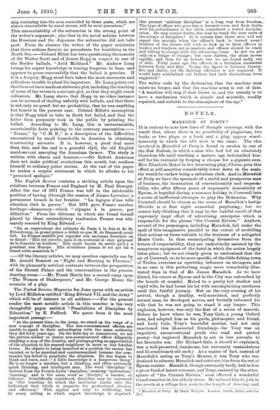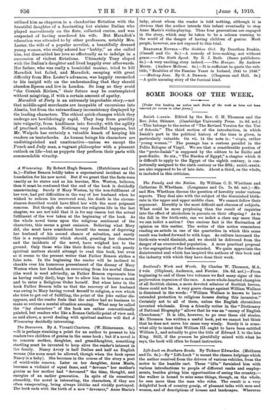NOVELS.
MARADICK AT FORTY"
IT is curious to note bow lines of thought converge, with the result that, where there is no possibility of plagiarism, two books or two plays, or a book and a play, appear simul- taneously in which the idle Inewe is the same. The idea involved in Haradick at Forty is found in eacelsia in one of the Bab Ballads, in which a man who had led an absolutely blameless life until reaching a mature age indemnified him- self for his restraint by forging a cheque for a gigantic sum. Miss Elizabeth Baker in her interesting play, Chains, puts this effort at self-assertion considerably lower down in the scale, the would-be outlaw being a suburban clerk. And in Meredith at Forty we have the spectacle of a stolid and prosperous man of business, the incarnation of conventionality and respecta- bility, who after fifteen years of impeccable domesticity at Epsom, is beguiled during a summer holiday in Cornwall into a series of ineffectual attempts to play the Bohemian. Why Cornwall should be chosen as the scene of Maradick's lvstige Streiche is at first sight somewhat perplexing ; but we cannot help thinking that it may be the baleful result of that supremely inept effort of advertising enterprise which is responsible for the phrase "the Cornish Riviera." Anyhow, several of the personages, including Maradick, fall under the spell of this imaginative parallel to the extent of modelling their actions on those suitable to the denizens of a mitigated Monte Carlo. In thus emancipating themselves from the fetters of respectability, they are undoubtedly assisted by the sumptuous equipment of the hotel in which the action largely takes place ; but we are clearly given to understand that the air of Cornwall, or, to be more specific, of the little fishing town of Treliss, exercises an upsetting influence on strangers, and in no case is this perturbing magic more remarkably illus- trated than in that of Mr. James Maradick. As we have hinted, his career at Epsom and in the City was untouched by the breath of scandal. Mated to a pretty but shallow and vapid wife, he had borne his lot with uncomplaining meekness until this fateful journey. But on the very evening of his arrival, though a healthy, well-nourished, and perfectly normal man, he developed nerves, and brutally informed his wife that he was not going to stand it any longer. This explosion, however, was only the first of a series of marvels. Before he knew where he was, Tony Gale, a young Oxford man, had adopted him as his guide, philosopher, and friend, and Lady Gale, Tony's beautiful mother, had not only sanctioned this ilbassorted friendship—for Tony was an impulsive, unconventional youth who read and quoted poetry—but implored Maradick to act in loco parentis to her favourite son. (Sir Richard Gale, it should be explained, was a well-preserved, handsome, but extremely cantankerous and ill-conditioned old snob.) As a matter of fact, instead of Maradick's acting as Tony's Mentor, it was Tony who was destined to educate Maradick and extricate him from the rut of Epsom routine. Maradick, though externally beefy, had in him a great fund of latent romance, and Tony, assisted by the atmo- sphere of "the Cornish Riviera," soon effected a wonderful transformation in his elderly chum. He induced him to join in the revels at a village fair, even to the length of dancing, and
at Forty. By Hugh Walpole. London: Smith, Elder, and Co.
utilised him as chaperon in a clandestine flirtation with the beautiful daughter of a fascinating but sinister Italian who played marvellously on the flute, collected curios, and was suspected of having murdered his wife. But Maradick's education was attended to by other professors, notably Mrs. Lester, the wife of a popular novelist, a beautifully dressed young woman, who really adored her " hubby," as she called him, but dissembled her love so effectually as to indulge in a succession of violent flirtations. Ultimately Tony eloped with the Italian's daughter and lived happily ever afterwards. Her father, who was really a homicidal maniac, tried to kill Maradick but failed, and Maradick, escaping with great difficulty from Mrs. Lester's advances, was happily reconciled to his insipid wife on the understanding that they should abandon Epsom and live in London. So long as they avoid "the Cornish Riviera," their future may be contemplated without misgiving, if with a certain amount of apathy.
Maradick at Forty is an extremely improbable story,—not that middle-aged merchants are incapable of excursions into Alsatia, but from the extraordinary inconsistency displayed by the leading characters. The ethical quick-changes which they undergo are bewilderingly rapid. They leap from gentility into vulgarity, from kindliness into ferocity, with the agility of practised acrobats. Nothing very dreadful happens, but Mr. Walpole has certainly a valuable knack of keeping his readers on tenterhooks. As human beings his characters are undistinguished and unattractive—unless we except the Punch and Judy man, a vagrant philosopher with a pleasant outlook on life—but as puppets they perform their parts with commendable vivacity.



















































 Previous page
Previous page